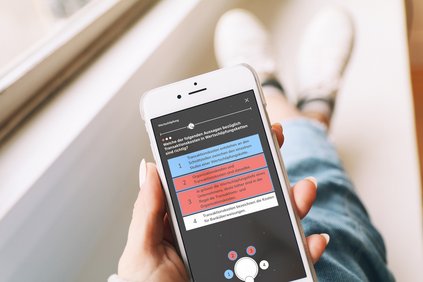Research - 30.01.2024 - 08:30
Monitoring and publishing of quality information in healthcare
The Swiss Federal Council wants to improve the transparency of quality information in the healthcare system. At the end of 2022, the Federal Quality Commission (EQC) set up by the Federal Council commissioned a project in which researchers from the University of St.Gallen played a key role. We spoke to project manager Dr Justus Vogel from the School of Medicine (Med-HSG).

Commissioned by EQK: Together with five Swiss universities, Med-HSG created a knowledge base for quality monitoring and transparency.
The project was organised by the university network Swiss Learning Health System (SLHS), of which the Chair of Health Economics, Policy and Management at the School of Medicine (Med-HSG) has been a member since 2020. In the project, a team of five universities from all parts of Switzerland (Lausanne, Zurich, Lucerne, St.Gallen, Ticino) jointly created a knowledge base for quality monitoring and transparency. The researchers from HSG were in charge of the project’s content.
Justus Vogel, what did your project look at?
Our team was tasked with demonstrating to the EQK the quality of information found in the monitoring and public reporting in the Swiss healthcare system. In a first step, we developed a reliable knowledge base as a basis for decision-making by analysing and comparing eight monitoring systems and 18 websites from eight countries. These include Switzerland, Germany, England, France, the Netherlands, Sweden, the USA and Australia. It was found that the monitoring approaches and the publication of quality information differ greatly in terms of objectives, target audience, content, data origin, analysis and structure.
At the centre of the project was the research question of which interest groups would like to use a monitoring system and for what purpose, who has a need for public reporting of quality information and what the published information would be used for. In a second step, we held workshops with stakeholders, so-called "stakeholder dialogues", to find answers to this question.
Can you give us an example of a monitoring system?
Yes, in France, for example, a rigid monitoring system is used, the so-called "certification des établissements de santé". In addition to measuring over 100 quality indicators for acute hospitals, psychiatric centres and rehabilitation clinics, a certification process is carried out every four years. Audits are carried out as part of this process. Treatment processes and situations are assessed on site, staff are interviewed and patients are surveyed. Other monitoring approaches are based more on the analysis of secondary data. In Germany, for example, self-reported quality indicators from acute somatic hospitals are evaluated and, in the event of inadequate quality, a "structured dialogue" is held with the hospitals to identify quality deficits and, if necessary, define quality improvement measures.
Can you tell us more about the stakeholder dialogues?
With pleasure. We held seven stakeholder dialogues throughout Switzerland. These were five workshops with professionals from the various sectors of the healthcare system and two workshops with patients, their relatives and the general public. Depending on the composition of the group, the workshops were held in German, French, Italian or English and in some cases in several languages simultaneously. At one workshop in Lugano, for example, all four languages were spoken - a personally enriching experience.
The discussions centred on the following questions: Which stakeholders need access to which quality information? Should quality be monitored in Switzerland? Should quality be publicised and if so, how? The discussions provided us with important impulses and insights, which we ultimately summarised in a final report with recommendations for the Swiss healthcare system.
What surprised you?
People with acute health problems do not initially ask themselves whether a service provider, e.g. a hospital or practice, is of better or worse quality. First and foremost are questions such as: Who do I turn to for complaints? Who specialises in my health problem? Where is capacity available and where will I be admitted for treatment?
Only when these questions have been clarified can the question of the quality of individual service providers be asked in comparison to others. And here, too, you first need to realise that you have a choice and that you can potentially influence the success of your own treatment by making the "right" choice. We heard emotional stories from patients who, it became clear that this awareness was often only developed after multiple treatments and through personal experience with the healthcare system.
What can healthcare professionals learn from your study?
We have derived a total of seven recommendations from the findings. One of our conclusions is that quality measurement in Switzerland does not need to be reinvented but can be built on existing data sources and initiatives. In addition, rather than simply building "another website" to publish quality information, particular emphasis should be placed on intuitive visualisation and a website designed with the needs and decision-making processes of users in mind.
But how do patients find out about such a website and who helps them find their way around?
This is where referring doctors or other medical professionals come into play, who could ideally act as "coaches" in the future and take on an even more explanatory and advisory role in the choice of service provider than they do now. For example, they could conceivably go through the website step by step with patients and weigh various options together. This would give GP practices and telemedicine centres an even greater responsibility in the future: They could create awareness that the quality of service providers varies and the more complex the treatment, the more relevant the decision of where or by whom to be treated. The aim is always to enable the patient to make their own informed decision. In my view, this approach is very much in line with the philosophy of "federal" personal responsibility and therefore fits very well in Switzerland.
Who was involved in the project?
Our report was compiled by researchers from the Swiss Learning Health System (SLHS) university network. In addition to our team from the Chair of Health Economics, Policy, and Management at HSG, researchers from the Universities of Zurich, Lucerne, Lausanne and the Scuola universitaria professionale della Svizzera italiana (SUPSI) were involved in the project. We were in charge of the content and were the experts for the acute somatic hospital sector and psychiatric care. The participating researchers from the other universities acted as topic experts for one or more areas of healthcare. For example, the Institute of Family Medicine at the University of Zurich was involved as the experts for the outpatient practice sector. In my view, this interdisciplinary teamwork has shown that a national research project involving universities from all parts of the country works very well.
In addition to our team, the stakeholders taking part in the workshops - both healthcare professionals and representatives of patients, relatives and the general public - made a very significant contribution. All workshops were characterised by constructive exchange and a high level of interest in and intrinsic motivation for the topic. We are correspondingly grateful to all participants.
What are the next steps?
Several follow-up projects based on our recommendations are currently being tendered by the EQK, including the conceptualisation, development and operation of a platform on which the quality information of service providers from all healthcare sectors in Switzerland is to be published. I am very interested to see how the important issues of quality monitoring and quality transparency in Switzerland develop over time.
The full report can be found at: bag.admin.ch/eqk
More articles from the same category
This could also be of interest to you
Discover our special topics
















